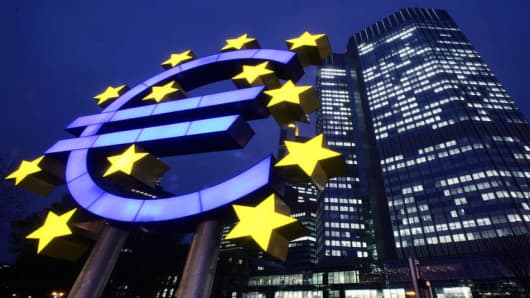However, policymakers Axel Weber of Germany and Yves Mersch of Luxembourg said the strong euro (EUR- was just one factor the ECB took into account when assessing the growth and inflation outlook.
Despite the dampening effect on prices from the strong euro, Weber said there was a risk that inflation could overshoot the ECB's 2 percent price stability ceiling in 2008 and 2009, the period which is most relevant for medium-term policy setting.
"There is a risk that we will end up above our inflation threshold of 2 percent," he told reporters on the sidelines of a conference.
"There is a certain risk that we will not fall below (it) further on, even in 2009. It very much depends on future developments of oil prices," he said. "We will act in a firm and timely manner to counter these risks."
Oil Prices
High oil prices outweighed the euro's dampening effect on inflation, and the ECB was determined to prevent any knock-on effects from an acceleration in inflation in the next few months, he added.
The ECB left interest rates at 4 percent on Thursday and analysts expect no change before the end of next year due to downside risks to economic growth as well as inflation worries.
Inflation reached a two-year high in October and the ECB has warned this is likely exaggerate a "hump" in inflation expected in the next few months due to energy base effects.
The ECB must walk a fine line between talking tough on inflation and not fuelling further euro appreciation, which hurts companies. The strong euro also acts as a drag on economic growth which is already under pressure from financial market turbulence.
Allianz finance chief Helmut Perlet said on Friday that the weak dollar cost the insurer about 250 million euros in profits in the first nine months of the year. EADS, the maker of Airbus planes, also said this week the slide would force it to find an extra 1 billion euros in savings by 2010-11.
"Brutal Moves"
In Luxembourg, Mersch said the ECB would do whatever was needed to meet its price stability goal, while avoiding any specific comment on future rates.
Asked about Trichet's remarks on abrupt shifts in exchange rates, he said, "That is what he said: 'There should not be brutal moves'. And we have also said in the past that there should not be a disorderly unwinding of international disequilibria."
"Obviously if there were to be brutal moves, the dangers of disorderly unwinding would be increased," Mersch said at a seminar. Weber and Liikanen both said they stood by Trichet's comments, but declined to comment further.
Mersch expected third-quarter euro zone GDP growth data -- due for release on Nov. 13 -- to be strong, but said that the United States had not yet seen the full consequences of the subprime mortgage crisis.
"Normally the third-quarter (euro zone) growth figures should be pretty good. In the United States too, macroeconomic data for the third quarter has been higher than one might have expected ... but that only means the (subprime) impact has not yet become visible in hard data," he said.
Strong Third Quarter Growth
The European Commission said on Friday the strong third quarter should boost GDP this year, upgrading its growth forecast to 2.6 percent from 2.5 percent, before slowing to 2.2 percent in 2008.
Weber said downside risks to growth had increased in the last few months, a factor which would be reflected in December's rate decision and the next round of ECB staff forecasts.
"The upside risk to inflation and the downside risks to growth have increased since September and we will factor this in our deliberations in December," he said.
Weber said there had been some improvement in financial markets but uncertainty remained, while Finland's Erkki Liikanen, speaking at the same event, said money market rates were still very high in the longer term.
"It is very clear that risk premia were unnaturally low for a long time. In the future they will remain on a more healthy level," Liikanen said. "As to the difference between collateralised and non-collateralised 3-month (lending), they are still exceptionally high."
There is a 51 basis point spread between unsecured three-month interbank lending and the risk-free equivalent. That compares with a handful of basis points before market turbulence began in August.
Bundesbank Vice-President Franz-Christoph Zeitler said in a speech that although money markets were normalising, the impact of the U.S. subprime mortgage crisis was now being felt in bank balance sheets and share prices.


